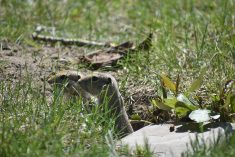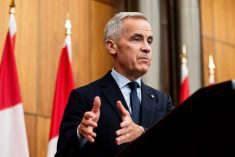Longtime Alberta Liberal Senator Joyce Fairbairn, for years a prominent player in Senate agriculture debates, is leaving active Senate duty on sick leave as she battles Alzheimer’s disease.
The 73-year-old former journalist and longtime aide to former prime minister Pierre Trudeau is going on sick leave from the Senate, where she has worked since being appointed by Trudeau in 1984.
With mandatory retirement at age 75 Nov. 6, 2014, she likely will not return to Senate duties.
In addition to promotion of the agricultural industry in her native southeastern Alberta area and her years on the Senate agriculture committee, where she served as chair, Fairbairn also has been an advocate for literacy and a promoter of the Paralympics.
Read Also

Government to invest in biofuel production
The federal government will invest $370 million in a new biofuel production incentive.
She was a founding member of the Senate committee on aboriginals and in 1990, was honoured by the Blood Nation with the name, Morning Bird Woman.
She has been a member of the University of Lethbridge Senate.
She served as co-chair of the successful Liberal election campaign of 1993 that produced a majority Liberal government.
Prime minister Jean Chrétien rewarded her by naming her the first female leader of the government in the Senate. She was named to the Privy Council in 1993 as a minister with responsibility for literacy.
For several years, Fairbairn has appeared frail, but she was a regular attendee at Senate agriculture committee meetings and Senate votes.
She was diagnosed with Alzheimer’s earlier this year.
In a Senate speech in 1990, Fairbairn spoke about her mother’s decline from the same disease.
“When that diagnosis was made, she was quickly losing many of her cognitive faculties, including speech,” she said. “It just went away. Both she and (caregivers) taught me a great deal about coming to grips with something that I could neither see nor hear.”
In her life before politics, she was a Parliament Hill reporter in the 1960s, covering the toxic political battles between Liberal Lester Pearson and Progressive Conservative John Diefenbaker.
She was covering Parliament on May 18, 1966, when disgruntled and disturbed Albertan Paul Joseph Chartier tried to throw a bomb onto the floor of the House of Commons, but instead blew himself up in a washroom where he had lit the fuse.
He died in the arms of Alberta MP Hugh Horner, a medical doctor summoned to assist after the explosion.














